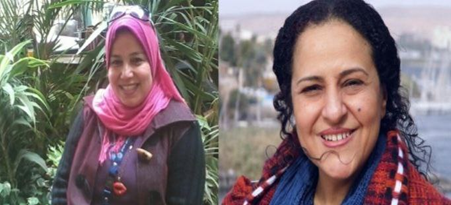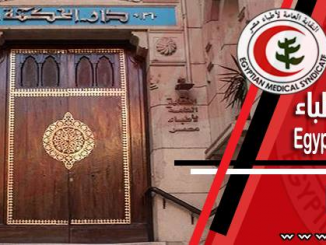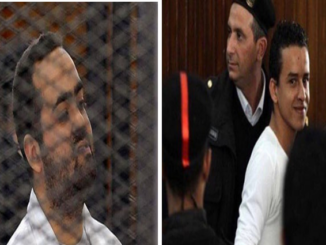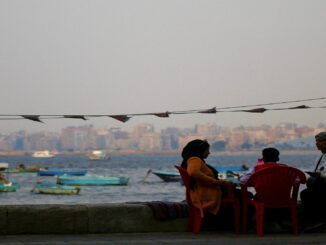
On the World Press Freedom Day, Tuesday, 3 May 2022, U.S. lawmakers and various human rights organizations highlighted Egypt’s dire press freedom record and to demand the release of jailed journalists
Various human rights organizations and U.S. lawmakers on the occasion of the World Press Freedom Day on Tuesday, 3 May 2022, took advantage of the annual occasion to draw attention to Egypt’s dire press freedom record and to demand the release of jailed journalists.

In the U.S. Senate, a bipartisan group introduced a resolution aimed at “recognizing widening threats to press freedom and free expression around the world” that listed Egypt as a particularly egregious offender.
The resolution remarks that “Egypt’s restrictions on the media have accelerated under Egypt’s Abdel Fattah al-Sisi since 2013, with at least 25 journalists imprisoned during 2021.”
The resolution highlights the cases of bloggerAlaa Abdel Fattah, freelance journalist Ismail Alexandrani, Al Jazeera journalist Hisham Abdel Aziz, and freelance photographer Mahmoud Abou Zeid.

It is noteworthy that Egypt dropped even further in Reporters Without Borders’ (RSF) World Press Freedom Index, from 166th out of 180 countries last year (2021) to 168th in this year’s edition (2022). RSF stressed that Egypt is “one of the world’s biggest prisons for journalists” and that “pluralism is essentially non-existent.”
On its side, the Egyptian Network for Human Rights listed 59 journalists currently behind bars in Egypt, whether in pretrial detention or serving unjust prison sentences.

Although several journalists were released from prison last week, dozens remain, including two state media workers who were recently arrested after participating in protests.
TV presenter Hala Fahmy and journalist Safaa al-Korbagy, two outspoken critics of senior management at the National Broadcasting Authority, appeared before the Supreme State Security Prosecution in recent days, according to their lawyers.
Korbagy and Fahmy both participated in state media worker protests that began in January and shared videos of their support for the strikes on their social media accounts, in which they also voiced criticism of working conditions in state media, and, in Fahmy’s case, of the president.
Korbagy was ordered detained for 15 days pending investigation on Sunday, and Fahmy was also ordered detained for 15 days.
Korbagy was arrested on Thursday from her Moqattam home where she lives with her mother, and she remained forcibly disappeared for three days before being presented before the prosecution, according to her lawyer Ali Ayoub.
“Security forces came to Korbagy’s house at around 3 am on Thursday and broke into the apartment. They searched it, cut the internet wires, confiscated a laptop and tablet, and scattered the contents of the apartment. My client was allowed to change her clothes and prepare a bag before she was taken to an unknown location,” he explained.
Authorities denied that Korbagy was being held in State Security Prosecution custody when Ayoub made enquiries on Thursday, he said. Yet, on Sunday, he was informed that she had been in their custody since the day of her arrest.
During her disappearance, Korbagy was questioned by the prosecution without a lawyer present, said Ayoub, “a violation of the Constitution and the law governing the legal profession.”
Journalists Syndicate head Diaa Rashwan was informed of Korbagy’s disappearance so that he could take steps to follow up on her case with the relevant authorities, according to syndicate member Mahmoud Kamel.
Korbagy published videos on her Facebook account that showed her participating in protests that began in January against the National Broadcasting Authority over poor working conditions and overdue payments alongside thousands of state media workers.
She was fired from her job at Radio and Television magazine early in 2022. Ayoub said that Korbagy’s firing, which coincided with her taking sick leave, constituted an arbitrary dismissal, adding that he lodged an appeal against the decision.
On the same day of Korbagy’s arrest, TV presenter Hala Fahmy became unreachable. On Sunday, Fahmy was arrested and questioned by the prosecution without being granted access to legal representation, said lawyer Khaled Ali, who is now acting in Fahmy’s defense.
Ali only learned of her detention as the prosecution was set to resume her questioning on Tuesday, when Fahmy told other lawyers who were present to contact him on her behalf, he said. She was handed 15 days in remand detention.
Fahmy’s last appearance in public took place a week before her arrest, when she posted two videos on her personal Facebook account.
In the videos, she claimed she was facing espionage charges for sharing a post campaigning for confidence to be withdrawn from the president.
She also said that she and her friend had been followed by strangers for days. She noted that she sought help from the Nozha police department in Cairo, but that they refused to lend her any assistance.
Fahmy was also among the state media workers who took part in the January protests. She called for the demonstrations to be escalated into a sit-in at the headquarters of the Egyptian Radio and Television Union in videos she posted on Facebook.



